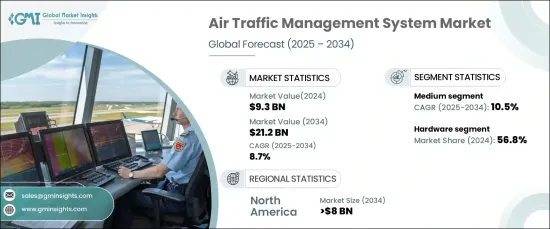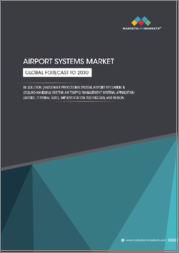
|
시장보고서
상품코드
1665410
항공교통 관리 시스템 시장 기회, 성장 촉진요인, 산업 동향 분석, 예측(2025-2034년)Air Traffic Management System Market Opportunity, Growth Drivers, Industry Trend Analysis, and Forecast 2025 - 2034 |
||||||
세계의 항공교통 관리 시스템 시장은 2024년에 93억 달러로 평가되며, 2025-2034년에 CAGR 8.7%로 확대할 것으로 예측됩니다. 전 세계 항공 여행 증가로 인해 여객 운송량과 항공사의 업무가 증가하고 있으며, 안전, 효율성, 원활한 운영을 보장하기 위해 첨단 항공 교통 관리 시스템이 요구되고 있습니다. 이러한 시스템은 자동화, 위성 기반 내비게이션, 인공지능 등의 기술을 통합하고 있으며, 점점 더 혼잡해지는 공역을 관리하는 데 필수적입니다. 이러한 시스템의 채택은 비행 경로를 최적화하고, 지연을 줄이며, 유인 및 무인 항공기 간의 조정을 개선하고, 궁극적으로 연료 소비와 환경에 미치는 영향을 최소화하면서 운항 효율을 높이는 데 도움이 됩니다. 항공 산업이 성장함에 따라 확장 가능하고 지속가능한 공역 관리에 필수적인 최첨단 항공 교통 솔루션에 대한 수요는 지속적으로 증가하고 있습니다.

하드웨어 솔루션은 2024년 시장 점유율의 56.8%를 차지하며, 운영의 안전과 효율성을 보장하는 데 있으며, 하드웨어 솔루션의 중요성이 강조됩니다. 감시 레이더, 통신 시스템, 항법 보조 장비와 같은 구성 요소는 항공기 추적을 개선하고, 협업을 강화하고, 항공 교통을 모니터링하는 데 매우 중요한 역할을 하며, ADS-B 센서 및 디지털 보조 레이더와 같은 기술 혁신은 더 나은 커버리지, 더 빠른 데이터 처리, 새로운 기술과의 호환성을 제공합니다. 데이터 처리 및 신기술과의 호환성을 제공합니다. 항공 교통량이 많은 공항과 지역에서는 엄격한 안전 및 효율성 기준을 충족하기 위해 신뢰할 수 있는 고성능 하드웨어에 대한 투자가 점점 더 많이 이루어지고 있습니다. 공항 인프라와 공역 시스템의 현대화는 차세대 항공 교통 시스템의 기본이 될 첨단 하드웨어 솔루션에 대한 수요를 더욱 촉진하고 있습니다.
| 시장 범위 | |
|---|---|
| 시작연도 | 2024년 |
| 예측연도 | 2025-2034년 |
| 시작 금액 | 93억 달러 |
| 예상 금액 | 212억 달러 |
| CAGR | 8.7% |
중형 공항은 예측 기간 중 10.5%의 연평균 복합 성장률(CAGR)을 보이고, 시장에서 가장 빠르게 성장하는 부문입니다. 이들 공항은 국내선과 국제선을 연결하는 중요한 연결고리 역할을 하고 있으며, 증가하는 승객과 화물량을 관리하기 위해 비용 효율적인 항공 교통 관리 솔루션을 채택하고 있습니다. 레이더 시스템, 항법 보조 장비, 통신 툴와 같은 기술은 이들 공항이 업무 효율성을 높이고, 안전을 보장하며, 교통량이 급증할 때 용량을 늘리는 데 도움이 되고 있습니다. 자동화된 비행 데이터 처리와 실시간 교통량 모니터링을 도입함으로써 중형 공항들은 자원 활용을 최적화하고 지연을 줄이고 있습니다. 대규모 인프라 변경 없이 항공 교통 시스템을 현대화하려는 노력은 지역 항공의 성장과 저비용 항공사의 운영을 지원하는 데 매우 중요합니다.
북미 항공 교통 관리 시스템 시장은 2034년까지 80억 달러 이상에 달할 것으로 예상됩니다. 항공 교통량이 증가함에 따라 운항 효율을 높이고 배기가스 배출량을 줄이기 위해 클라우드 기반 플랫폼 및 자동화 솔루션과 같은 차세대 기술에 대한 투자가 증가하고 있습니다. 미국은 디지털 영공 관리의 진보를 지원하기 위해 규제 프레임워크가 진화하고 있으며, 그 선두에 서 있습니다. 이러한 발전은 항공 교통을 관리하는 방식을 변화시키고 있으며, 지역 전체에 걸쳐 안전, 지속가능성, 영공 운영의 효율화를 강조하고 있습니다.
목차
제1장 조사 방법과 조사 범위
- 시장 범위와 정의
- 기본 추정과 계산
- 예측 계산
- 데이터 소스
- 1차 데이터
- 2차 데이터
- 유료 정보원
- 공적 정보원
제2장 개요
제3장 업계 인사이트
- 에코시스템 분석
- 밸류체인에 영향을 미치는 요인
- 이익률 분석
- 파괴
- 향후 전망
- 제조업체
- 유통업체
- 공급업체 상황
- 이익률 분석
- 주요 뉴스
- 규제 상황
- 영향요인
- 촉진요인
- 항공 여객 운송량의 증가와 항공회사 운항
- 차세대 항공교통 관리 시스템의 채택
- 안전기준과 효율 기준의 개선에 대한 수요 증가
- 공항 인프라 현대화에 대한 투자의 증가
- 통신·감시 시스템의 기술 진보
- 업계의 잠재적 리스크 & 과제
- 항공교통 시스템의 높은 초기 비용
- 엄격한 규제 준수가 도입 프로세스를 지연시킨다.
- 촉진요인
- 성장 가능성 분석
- Porter의 산업 분석
- PESTEL 분석
제4장 경쟁 구도
- 서론
- 기업 점유율 분석
- 경쟁 포지셔닝 매트릭스
- 전략 전망 매트릭스
제5장 시장 추산·예측 : 공역별, 2021-2034년
- 주요 동향
- 항공교통 서비스(ATS)
- 항공교통 흐름 관리(ATFM)
- 공역 관리(ASM)
- 항공 정보 관리(AIM)
제6장 시장 추산·예측 : 오퍼링별, 2021-2034년
- 주요 동향
- 하드웨어
- 소프트웨어
제7장 시장 추산·예측 : 설치 유형별, 2021-2034년
- 주요 동향
- 신규 설치
- 현대화 및 업그레이드
제8장 시장 추산·예측 : 공항 규모별, 2021-2034년
- 주요 동향
- 대규모
- 중규모
- 소규모
제9장 시장 추산·예측 : 용도별, 2021-2034년
- 주요 동향
- 통신
- 내비게이션
- 감시
- 자동화
제10장 시장 추산·예측 : 최종 용도별, 2021-2034년
- 주요 동향
- 상용
- 군용
제11장 시장 추산·예측 : 지역별, 2021-2034년
- 주요 동향
- 북미
- 미국
- 캐나다
- 유럽
- 영국
- 독일
- 프랑스
- 이탈리아
- 스페인
- 러시아
- 아시아태평양
- 중국
- 인도
- 일본
- 한국
- 호주
- 라틴아메리카
- 브라질
- 멕시코
- 중동 및 아프리카
- 남아프리카공화국
- 사우디아라비아
- 아랍에미리트
제12장 기업 개요
- Adacel Technologies Limited
- Airbus SE
- BAE Systems plc
- Honeywell International, Inc.
- Indra Sistemas, S.A.
- L3Harris Technologies, Inc.
- Leidos, Inc.
- Lockheed Martin Corporation
- Northrop Grumman Corporation
- RTX Corporation
- Saab AB
- SITA
- Thales
The Global Air Traffic Management System Market, valued at USD 9.3 billion in 2024, is projected to expand at a CAGR of 8.7% from 2025 to 2034. Rising global air travel is driving increased passenger traffic and airline operations, necessitating advanced air traffic management systems to ensure safety, efficiency, and seamless operations. These systems are critical for managing increasingly congested airspaces, as they integrate technologies like automation, satellite-based navigation, and artificial intelligence. Their adoption helps optimize flight paths, reduce delays, and improve coordination between crewed and uncrewed aircraft, ultimately enhancing operational efficiency while minimizing fuel consumption and environmental impacts. As the aviation industry grows, the demand for cutting-edge air traffic solutions continues to rise, making them essential for scalable and sustainable airspace management.

Hardware solutions accounted for 56.8% of the market share in 2024, underscoring their importance in ensuring operational safety and efficiency. Components such as surveillance radars, communication systems, and navigation aids play pivotal roles in improving aircraft tracking, enhancing coordination, and monitoring air traffic. Innovations like ADS-B sensors and digital secondary radars offer better coverage, faster data processing, and compatibility with emerging technologies. Airports and regions with high air traffic are increasingly investing in reliable, high-performance hardware to meet stringent safety and efficiency standards. The modernization of airport infrastructure and airspace systems further fuels the demand for advanced hardware solutions, which remain fundamental to next-generation air traffic systems.
| Market Scope | |
|---|---|
| Start Year | 2024 |
| Forecast Year | 2025-2034 |
| Start Value | $9.3 Billion |
| Forecast Value | $21.2 Billion |
| CAGR | 8.7% |
Medium-sized airports are the fastest-growing segment in the market, with a CAGR of 10.5% during the forecast period. These airports act as key connectors between domestic and international routes and are adopting cost-effective air traffic management solutions to manage rising passenger and cargo volumes. Technologies such as radar systems, navigation aids, and communication tools help these airports enhance operational efficiency, ensure safety, and boost capacity during peak traffic. By implementing automated flight data processing and real-time traffic monitoring, medium-sized airports optimize resource utilization and reduce delays. Their efforts to modernize air traffic systems without major infrastructure changes are critical to supporting regional aviation growth and low-cost carrier operations.
In North America, the air traffic management system market is expected to surpass USD 8 billion by 2034. Increasing air traffic has prompted significant investments in next-generation technologies, including cloud-based platforms and automation solutions, aimed at enhancing operational efficiency and reducing emissions. The United States is at the forefront, with regulatory frameworks evolving to support advancements in digital airspace management. These developments are transforming how air traffic is managed, emphasizing improved safety, sustainability, and streamlined airspace operations across the region.
Table of Contents
Chapter 1 Methodology & Scope
- 1.1 Market scope & definitions
- 1.2 Base estimates & calculations
- 1.3 Forecast calculations
- 1.4 Data sources
- 1.4.1 Primary
- 1.4.2 Secondary
- 1.4.2.1 Paid sources
- 1.4.2.2 Public sources
Chapter 2 Executive Summary
- 2.1 Industry synopsis, 2021-2034
Chapter 3 Industry Insights
- 3.1 Industry ecosystem analysis
- 3.1.1 Factor affecting the value chain
- 3.1.2 Profit margin analysis
- 3.1.3 Disruptions
- 3.1.4 Future outlook
- 3.1.5 Manufacturers
- 3.1.6 Distributors
- 3.2 Supplier landscape
- 3.3 Profit margin analysis
- 3.4 Key news & initiatives
- 3.5 Regulatory landscape
- 3.6 Impact forces
- 3.6.1 Growth drivers
- 3.6.1.1 Increasing air passenger traffic and airline operations
- 3.6.1.2 Adoption of next-generation air traffic management system systems
- 3.6.1.3 Rising demand for improved safety and efficiency standards
- 3.6.1.4 Growing investments in airport infrastructure modernization
- 3.6.1.5 Technological advancements in communication and surveillance systems
- 3.6.2 Industry pitfalls & challenges
- 3.6.2.1 High initial cost of air traffic systems
- 3.6.2.2 Stringent regulatory compliance slowing implementation process
- 3.6.1 Growth drivers
- 3.7 Growth potential analysis
- 3.8 Porter’s analysis
- 3.9 PESTEL analysis
Chapter 4 Competitive Landscape, 2024
- 4.1 Introduction
- 4.2 Company market share analysis
- 4.3 Competitive positioning matrix
- 4.4 Strategic outlook matrix
Chapter 5 Market Estimates & Forecast, By Airspace, 2021-2034 (USD Million)
- 5.1 Key trends
- 5.2 Air Traffic Services (ATS)
- 5.3 Air Traffic Flow Management (ATFM)
- 5.4 Airspace Management (ASM)
- 5.5 Aeronautical Information Management (AIM)
Chapter 6 Market Estimates & Forecast, By Offering, 2021-2034 (USD Million)
- 6.1 Key trends
- 6.2 Hardware
- 6.3 Software
Chapter 7 Market Estimates & Forecast, By Installation Type, 2021-2034 (USD Million)
- 7.1 Key trends
- 7.2 New installation
- 7.3 Modernization & upgradation
Chapter 8 Market Estimates & Forecast, By Airport Size, 2021-2034 (USD Million)
- 8.1 Key trends
- 8.2 Large
- 8.3 Medium
- 8.4 Small
Chapter 9 Market Estimates & Forecast, By Application, 2021-2034 (USD Million)
- 9.1 Key trends
- 9.2 Communication
- 9.3 Navigation
- 9.4 Surveillance
- 9.5 Automation
Chapter 10 Market Estimates & Forecast, By End Use, 2021-2034 (USD Million)
- 10.1 Key trends
- 10.2 Commercial
- 10.3 Military
Chapter 11 Market Estimates & Forecast, By Region, 2021-2034 (USD Million)
- 11.1 Key trends
- 11.2 North America
- 11.2.1 U.S.
- 11.2.2 Canada
- 11.3 Europe
- 11.3.1 UK
- 11.3.2 Germany
- 11.3.3 France
- 11.3.4 Italy
- 11.3.5 Spain
- 11.3.6 Russia
- 11.4 Asia Pacific
- 11.4.1 China
- 11.4.2 India
- 11.4.3 Japan
- 11.4.4 South Korea
- 11.4.5 Australia
- 11.5 Latin America
- 11.5.1 Brazil
- 11.5.2 Mexico
- 11.6 MEA
- 11.6.1 South Africa
- 11.6.2 Saudi Arabia
- 11.6.3 UAE
Chapter 12 Company Profiles
- 12.1 Adacel Technologies Limited
- 12.2 Airbus SE
- 12.3 BAE Systems plc
- 12.4 Honeywell International, Inc.
- 12.5 Indra Sistemas, S.A.
- 12.6 L3Harris Technologies, Inc.
- 12.7 Leidos, Inc.
- 12.8 Lockheed Martin Corporation
- 12.9 Northrop Grumman Corporation
- 12.10 RTX Corporation
- 12.11 Saab AB
- 12.12 SITA
- 12.13 Thales


















